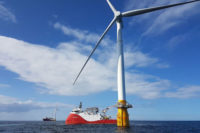Citing the "national emergency" spurred by the COVID-19 pandemic's economic hit, President Donald Trump has signed an executive order that directs federal agencies to bypass environmental laws to expedite infrastructure projects, including those on federal lands, as a stimulus.
"Antiquated regulations and bureaucratic practices have hindered American infrastructure investments," said the directive. "The need for continued progress in this streamlining effort is all the more acute now, due to the ongoing economic crisis."
The directive, which Trump issued after 6:00 PM on June 4, said it is intended to speed up federal approvals for transportation, energy and other projects to boost job growth and related investment.
Leading advocacy group Center for Biological Diversity said on June 9 it has moved to file suit against the new directive. Also speculated is how recent federal court rulings that reinforce or extend environmental permitting could clash with the order.
EPA Clean-Air Pushback
Also on June 4, the U.S. Environmental Protection Agency proposed to extend to all federal clean air rules a similar change made to its mercury-emissions regulation finalized in April that reduces reliance on "co-benefits" of cuts in other air pollutants to support the mandate, particularly compliance costs. EPA Administrator Andrew Wheeler said in a media briefing that such co-benefits would still be calculated, "but would not be used to justify the rule."
Related to the Trump emergency order, "agencies should take all reasonable measures to speed infrastructure investments and to speed other actions in addition to such investments that will strengthen the economy and return Americans to work, while providing appropriate protection for public health and safety, natural resources, and the environment, as required by law," the directive said.
Federal exceptions allow laws such as the National Environmental Policy Act (NEPA) to be bypassed on projects in emergency circumstances.
Trump has used a similar "national emergency" declaration to waive environmental rules on the multi-billion-dollar border wall construction program, as well as to divert billions of dollars for its construction from other DOD military building projects.
Meanwhile, the administration already proposed earlier this year major changes to NEPA rules that would streamline or minimize environmental reviews.
Fast-Track Project Shortlist?
The new emergency order would also accelerate civil works projects overseen by the U.S. Army Corps of Engineers and instruct the Interior, Agriculture and Defense departments to speed up projects on federal lands. Observers are not clear on whether the order also would expedite Interior Dept. approvals of wind energy projects, particularly offshore, which have not been favored by Trump.
Chiefs of the U.S. Transportation Dept. and U.S. Army civil works units, among other agencies, are to provide a list of expedited projects by July 4 to the Office of Management and Budget (OMB) and to White House economic and environmental advisors, with work progress updates every 30 days "for the duration" of the COVID-19 "emergency," said the order.
Corps spokesman Gene Pawlik said the agency "is working through what the order means and what the implications are, and will provide that information to the Army to meet its reporting requirements," declining to comment further on its projects to be expedited.
"I think we can safely move forward on the vast majority of projects without much angst," says Norman Anderson, CEO of Washington, D.C., infrastructure project consultant CG/LA Inc. "The backlog, caused by the inability of legacy bureaucracies to make decisions, is killing us. If we don’t do something, of course, we’re in for a pretty tough 3-5 years. We can’t wait until January, so we—in a democracy—need to make good decisions now."
But no details were released with the order or have been confirmed on added funding for projects to be expedited.
“Regulatory streamlining is part of the solution to moving an infrastructure-based recovery agenda forward, but what is equally important right now is funding, and a multi-year commitment to funding to give our federal, state, local and private partners the certainty they need to deliver projects,” says Jeff Urbanchuk, vice president of the American Council of Engineering Cos.
Nick Goldstein, vice president of regulatory & legal issues for the American Road and Transportation Builders Association, says the Trump order "doesn’t change any regulations. It’s a push to get agencies to use flexibility that already exists in NEPA and other regulations to expedite the review process in times of emergency."
He cites similar, but more limited use, of the waiver, in the repair of the collapsed Minneapolis bridge more than a decade ago, "which was rebuilt in a year and didn’t require a typical environmental review process."
"I expect the executive order will be challenged," says Goldstein. "Ltigants may claim that the regulations’ existing flexibility doesn’t apply to this kind of emergency." He says the order could possibly apply to new projects "if the emergency goes on, but the goal is to move current projects."
Protections at Risk
Critics noted that while the administration cites the financial downturn caused by COVID-19 to justify the order, “gutting NEPA has been a policy priority of the administration since taking office,” the Southern Environmental Law Center said in a statement.
The changes are expected to be approved within weeks.
House Speaker Nancy Pelosi (D-Calif.) said "House Democrats oppose the president's latest assault on vital environmental protections."
She added that "by using the pandemic to justify fast-tracking potentially dangerous, wasteful or destructive infrastructure programs, the president has proven once again his utter contempt for our laws."
But Pelosi also called for advancing "robust investments in sustainable and resilient infrastructure that strengthens, not diminishes, protections."
Susan-Jane Brown, an attorney for the Western Environmental Law Center, said the Trump order's impact "really depends on how [it] is applied," according to a report in E&E News. She said NEPA has provisions for an expedited process, but stressed that they only delay, but don't waive environmental review obligations.
"Simply saying we've got an economic emergency on our hands and therefore go build large infrastructure projects — it just doesn't work that way in the real world," she said.








Post a comment to this article
Report Abusive Comment